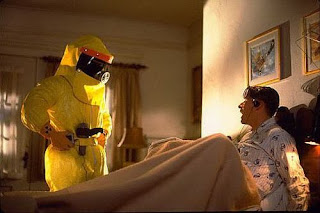"...The encounter could create a time paradox, the results of which could cause a chain reaction that would unravel the very fabric of the space time continuum, and destroy the entire universe! Granted, that's a worse case scenario. The destruction might in fact be very localized, limited to merely our own galaxy."
Doc Brown, Hill Valley, 2015
So, John Daly-Peoples, of the National Business Review, writes a preview of the performance of Mahler's Sixth Symphony by the Auckland Philharmonia.
MAHLER'S TRAGIC TALE
This week the Auckland Philharmonia will be playing one of the first and probably the greatest autobiographical symphony of the twentieth century with Gustav Mahler’s sixth symphony.
Autobiographical symphony? Okay, I guess. Premiered in 1906, and sometimes know by the editorial title "Tragic Symphony", many historians, and even Mahler's wife have made overtures of the autobiographical meanings in the work.
However, Mahler was seemingly at a happy point in his life, having recently married Alma Schindler and enjoyed the birth of a baby daughter during the composition of the piece...but hey, I didn't know the guy, perhaps it was inner torment.
But I digress...
Beethoven’s great symphonies portray mankind in a heroic manner. He attempted to show man in pursuit of higher aims but they were figures of almost mythic proportions.
I guess it is true that you can't write about Mahler without mentioning Beethoven...
Mahler on the other hand puts himself at the centre of the music with the music expressing his own fears, emotions and aspirations.
Like the contemporary thinkers such as Sigmund Freud he was endeavoring to find the universal truths from within the individual.
Composed in the early years of the twentieth century the sixth symphony...
wait for it...
Composed in the early years of the twentieth century the sixth symphony presages the tumultuous world evenmts [sic] to come.
The symphony does what now? Presages? So it's not just autobiographical, it's a fortune teller?
Is Mahler not aware that having knowledge of the future could possibly screw up the space-time Continuum and endanger his own existence?
 figure trois: "Marvin, you gotta play. See that's where they kiss for the first time on the dance floor. And if there's no music, they can't dance. If they can't dance, they can't kiss. If they can't kiss they can't fall in love, and I'm history. "
figure trois: "Marvin, you gotta play. See that's where they kiss for the first time on the dance floor. And if there's no music, they can't dance. If they can't dance, they can't kiss. If they can't kiss they can't fall in love, and I'm history. "And oh, "evenmts"?
It also prefigures the calamities which would afflict the composer; the death of his daughter, his loss of prestige in being dumped from the Vienna Sate Opera and his being diagnosed with a terminal heart condition.
Damn. I wonder how his fate would have been different if he had just added more cowbell?
Are we not at least a little surprised that Mahler had supernatural powers? Is this common knowledge -- Mahler gazed into the future and wrote a symphony about what he saw?
Guess so. Although, to be fair, in the original program notes Mahler added this little anecdote that may illuminate his omens of doom in the work:
"Last night, Darth Vader came down from planet Vulcan and told me that if I didn't take Lorraine out that he'd melt my brain."
----------------------
From now on, when writing and thinking intellectually about music, can we agree to seek out rational explanations for the underlying story behind a piece of music rather than to attribute mystical powers? Thanks.




